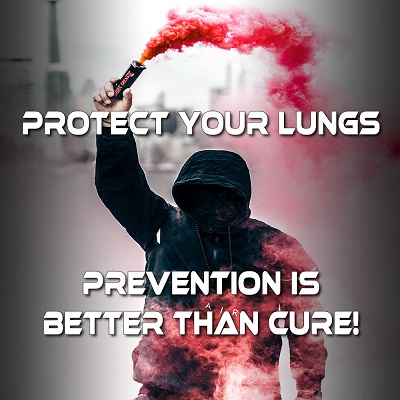 Problems with the lungs and respiratory system, in general, have long been a primary cause of hospitalization and deaths worldwide. Because of the several common illnesses that can affect the respiratory system, many products have come onto the market, claiming to help clean the lungs for better respiratory health.
Problems with the lungs and respiratory system, in general, have long been a primary cause of hospitalization and deaths worldwide. Because of the several common illnesses that can affect the respiratory system, many products have come onto the market, claiming to help clean the lungs for better respiratory health.
However, many people are not aware that using these products, while helpful to some, is not entirely necessary. This is because our lungs have the capacity to clean themselves on their own.
After someone has recovered from an illness caused by a viral or bacterial infection, doctors believe that the lungs can clean and even greatly repair themselves.
As with all aspects of human health, prevention is always better than cure. Although the lungs do have a large degree of self-healing ability, any damage to the lungs has an impact on the vitality and health of the whole body.
Oxygen availability is vital to our wellbeing, and we rely on our lungs to enable that. When our cells are deprived of oxygen, both short and long-term health can be impacted.
Lung damage can occur due to many different reasons. Most of these can be protected against or prevented. Some are totally within our sphere of control, while others are harder to prevent.
Almost all can be mitigated against to some degree. Here are some of the ways we can prevent causing or allowing damage to occur to our lungs:
Protect Yourself from Infection
While the lungs can recover from viral infections on their own, some other infections can leave permanent scarring. It is still best to avoid getting infected in order to keep the lungs healthy. Protect yourself from infections by getting vaccinated for flu and pneumonia regularly and avoiding contact with people who are sick.
Keeping yourself and your environment clean through proper and frequent handwashing, as well as sanitizing items that you often use, such as cellphones, doorknobs, and light switches can help you steer clear of infections.
Avoid Pollution
Air pollution can weaken the lungs and can cause long-term damage to the respiratory system. Pollutants such as engine smoke, fire, and even dust can affect the ability to breathe properly.
While completely avoiding pollution may seem impossible, especially if you live in an urban city, there are always ways in which we can reduce the impact of its harmful effects.
These can be basic but have a large effect, such as more frequent vacuuming to help reduce dust inhalation. It may be possible to install an air purifier in your home to get rid of harmful pollutants in the air. Make conscious and wise choices when out of the house.
If walking, stand further back from the road to minimize the intake of dangerous particulates from motor vehicle exhausts. As much as possible, time your excursions to avoid peak-hours and high-volume times.
Embrace a Healthy Lifestyle
Alongside quitting smoking, practicing a healthy lifestyle can greatly improve lung health. Eating foods that are rich in antioxidants such as green leafy vegetables can help protect yourself from damage caused by smoke and air pollution. Drinking green tea, which contains antioxidant and anti-inflammatory properties, has been proven to reduce the risk of chronic pulmonary diseases.
Apart from eating healthy food, regular exercise is very beneficial to the lungs. Cardiovascular exercise such as running or aerobics will strengthen the lungs and improve respiratory function.
Changing our habits and our way of life can have a huge impact not just on our lungs but to our overall physical wellness, too. Start on these habits today to enjoy the benefits of cleaner and healthier lungs.
Quit Smoking and Avoid Passive Smoking
If you are a long-time smoker, quitting the habit is the first step towards clean lungs and the one that will have the biggest impact. Smoking affects the lungs by destroying and inflaming the air sacs in the lungs, causing emphysema or chronic bronchitis and even permanent structural damage to the lungs.
According to doctors, quitting smoking as soon as possible increases the rate and degree of healing. A large scale study revealed that people who had stopped smoking for 20 years had much lower chances of contracting chronic lung diseases than those still smoking. Also, after that period, the lungs have regained their function as if they hadn’t been affected by smoking at all.
If you are a non-smoker, you should take steps to protect your lungs from second-hand smoke. Numerous research studies have shown that inhaling second-hand smoke is just as harmful, or can even be more harmful than smoking itself. Similarly, vaping can also be harmful, as it has been shown to decrease the lungs’ ability to clear out mucus, which can encourage respiratory infections.






